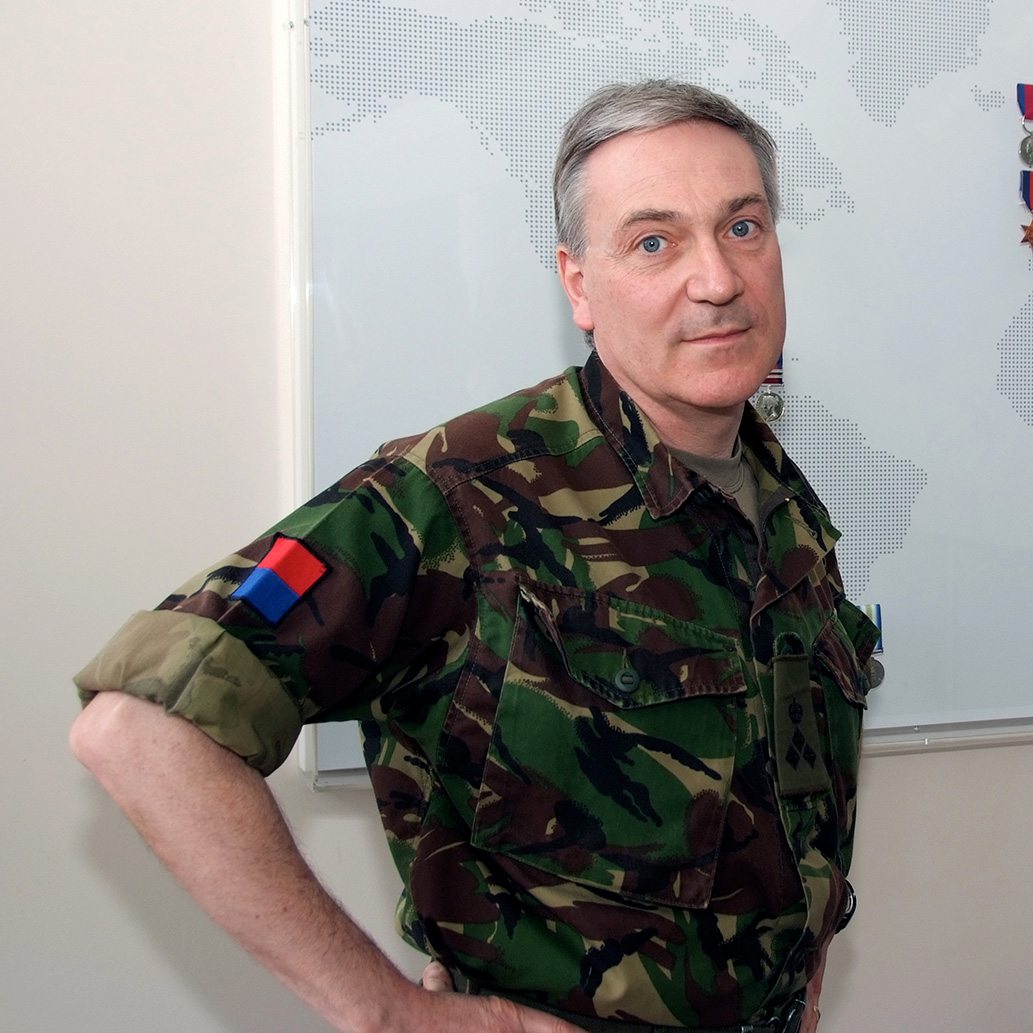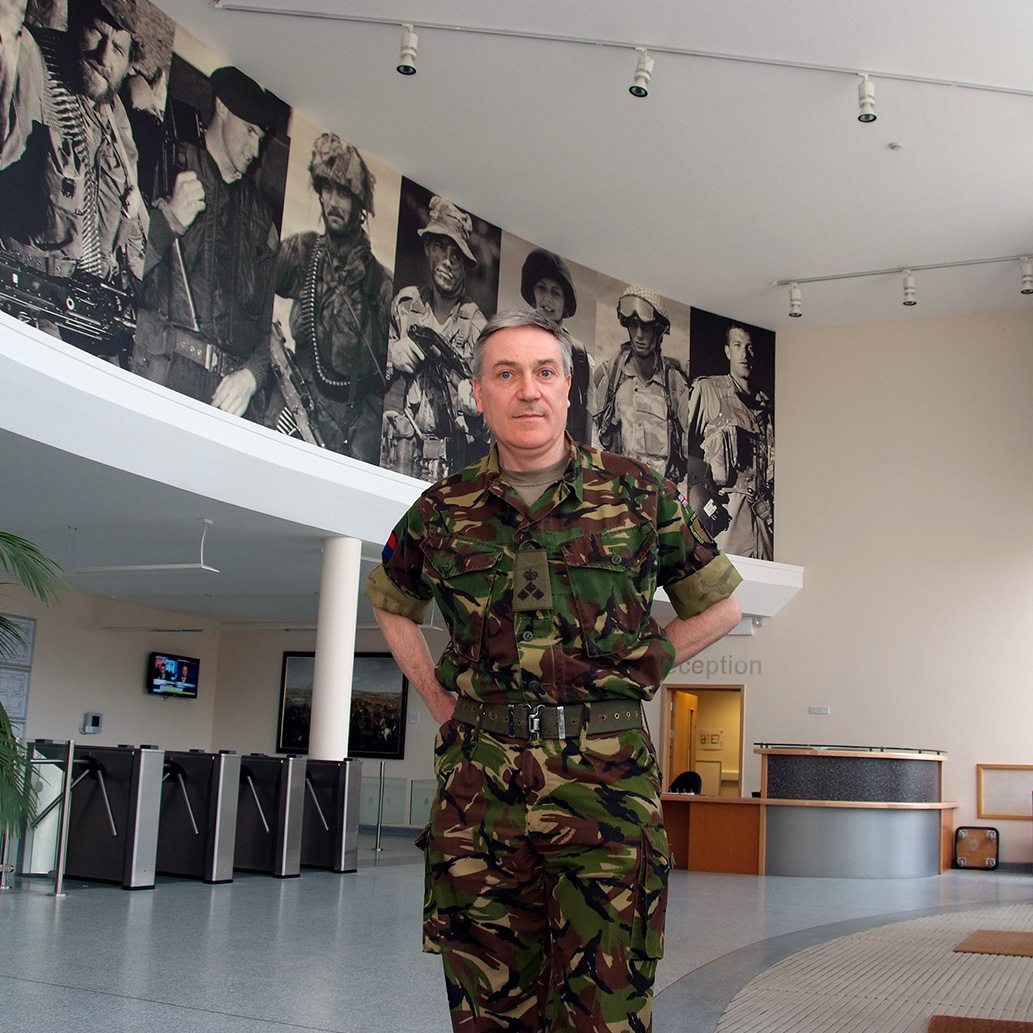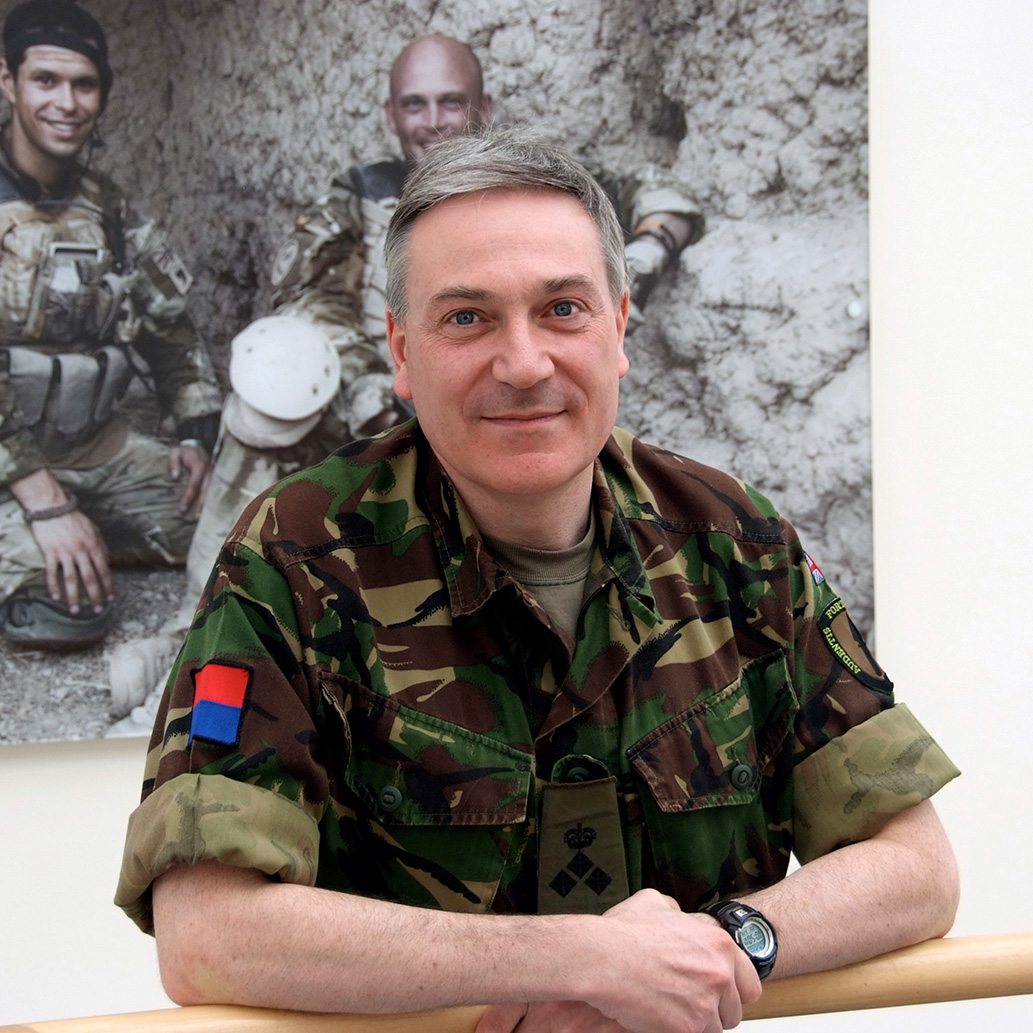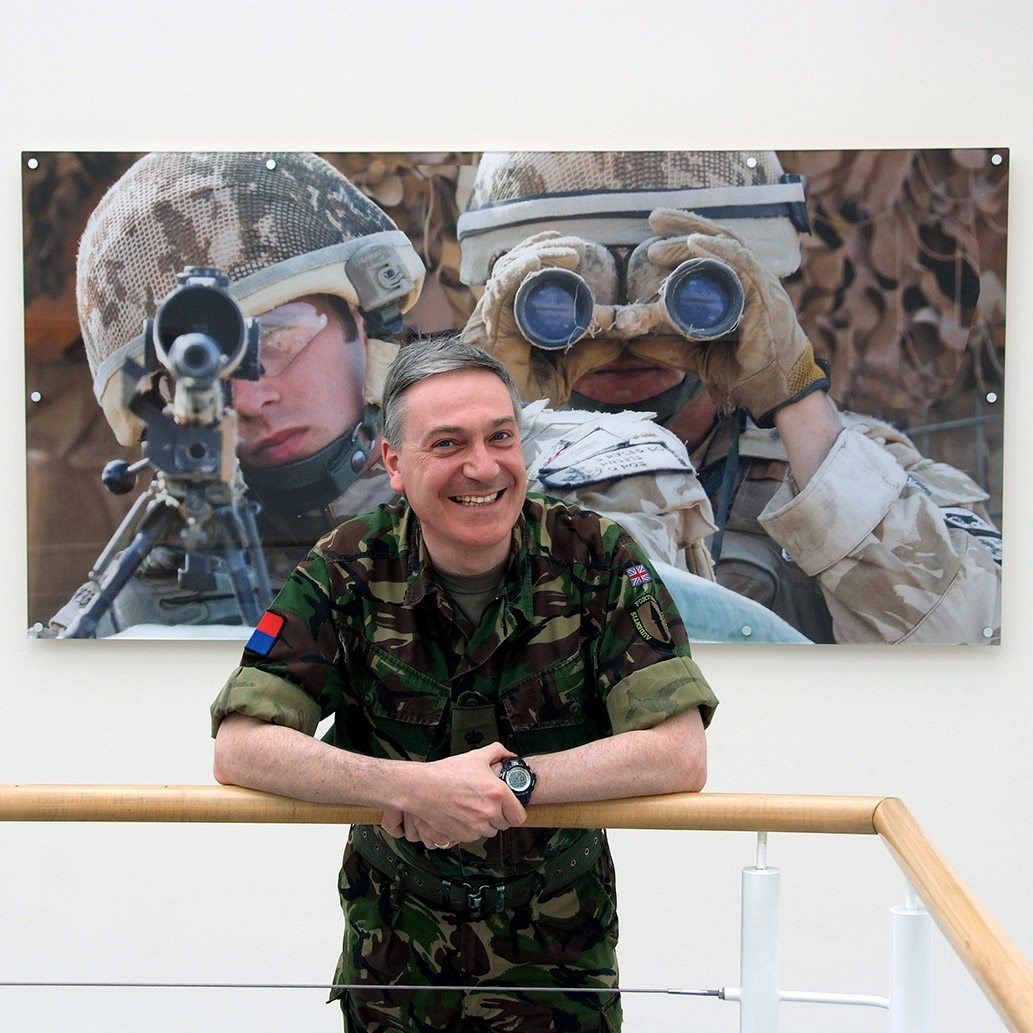Richard, give us some idea of your early career, how you decided on an Army career...and why HR?
I’m not from a military family background and when I joined the Army that put me in the minority rather than the majority; it’s changed now. When I came into the Army, I was awarded what’s called an Army scholarship at the age of 16. I joined because I met someone who was a complete inspiration, a fantastic man who had fought all the way through the First and Second World Wars, and I met him just before he died. He was talking about his time in the Army and how much he had loved it, and leading soldiers was the best thing in his life; they were the most wonderful people to command and lead. That inspired me to have a look at it, as I had not thought of joining the Army until that point. I went through a selection process at 16 and then the Army paid for me to go to university and do a non-military degree. When I went to my first regiment after Sandhurst, I was shocked as it wasn’t a happy place. It was the Cold War, mid-eighties, stuck in Germany, and I didn’t think my soldiers were being treated well by the system. I was very young and naïve and believed everything they said to me, so inevitably I had a skewed view of it.
But I made a promise to myself, that I’d only stay in the Army if I could do something that would benefit and improve Army life; not just material factors, but commanding them well, and improving the way they were trained and developed. That early experience has stayed with me, from being a young artillery officer serving in Ireland, to later tours in Iraq and Afghanistan, and since I have been in the HR area I have been able to help change the Army, to have a different way of thinking about its people. Fundamentally, there were some philosophical and moral issues to consider. For example, if someone is prepared to lay their life on the line for their country, does the Army owe them a job for life… is one day’s fighting sufficient to give you a job for life? Up until a few years back the Army’s view had been broadly yes, and I questioned that, is that actually right? After one day in real battle and you’ve done ‘your bit’ at the age of 18 or 19, should the Army sustain you for years to come? My opinion was that there was too much risk to say that there is a job for life, right from the beginning. That’s what was on offer, “a job for life” from the very start, and in my view that was wrong; as a profession, the Army should ensure you are looked after, as best it can, but not necessarily through full time employment. This change in philosophy has impacted on many different elements of the British Army as an employer. The Army is all about people and in HR you can deliver a real material benefit for people.

But retention is essential, especially in a hierarchical rank structured organisation.
Of course, the profile of the British Army as a career choice was changing rapidly at the point I joined, and yes it does offer great excitement and experiences. We are an employer that takes retention very seriously indeed and the people you retain today are tomorrow’s leaders. The Army has always offered a career until you are 55, for those who aregood enough, our officers and best soldiers (who in most cases become officers after they have reached the top of the soldier ranks); I wonder,though, whether the prospect of a career for life is a realistic expectation in the 21st century, where the world of work flits between careers and jobs. The Army is different, but I would argue it is more similar than people think.

I guess you are a case in point, as head of HR.
Yes, here I am, an HR practitioner, but I have conventional Army experience, commanding soldiers, up to Brigadier level, but if I wanted to go into combat or logistics I could do that. I stay within the same uniform, pay structure and career structure, but I can branch out, or specialise; and our soldiers are the same,although they tend to specialise more rapidly and become the true masters of their trade. I commanded my Regiment in Iraq in 2003, and ended up running the local district council, an entirely new experience in some ways,and certainly a bit dangerous in Iraq. But that typifies the broad set of skills and capabilities a modern Army needs, way beyond combat capabilities.

What is it like for a young person who joins the Army, and very quickly finds they are on their way to a warzone.. that must be a reality check?
Primarily the role of the British Army has changed very little. To coin a rather quaint and antiquated phrase it is “to kill or capture the Queen’s enemies”. That brings with it an inherent risk, and the sad number of casualties is evidence of that. I think anyone joining any Army, not contemplating this reality would be naïve. These are dangerous and unpredictable times of great change. But we never pretend that joining the Army does not present danger, and for some, that is part of the attraction. I think we’ve been reflecting on this recently, getting to grips with the key ingredients about team cohesion, loyalty within the team, fighting for the bloke next to you. That team cohesion is something we try and build in our young soldiers and officers right from the word go, to the extent that when people leave the Army after four years or thirty years, they often continue to have a deep sense of loyalty to the Army.
It is a fact that a number of people leave the Army and struggle with integrating back into mainstream civvy street.
I find it very interesting that the Army is often associated with people who are homeless, on the streets. We did a lot of research and this revealed that many of those who are homeless, stating they were in the Army, joined for less than the minimum time of four years. And it often takes about four years in the Army to develop the skills and experiences that can shape you for life. It is interesting that those homeless, many of whom spent less than four years in the Army,define themselves as “ex-forces”, even if they were in for a few weeks or months; so even people who have not necessarily succeeded in the Army have a deep sense of loyalty. And it is worth saying that, despite some who struggle, approximately 8000 soldiers leave the Army each year, the vast majority of whom are that much better equipped to take their place back in civilian society. If I look at my own experience, I have another six or seven years before I retire,and if I left now, the hardest thing to overcome would be the feeling that I was letting others down; I don’t think you often get that strength of loyalty in conventional businesses.
My first command was a troop of 50, I could name almost all of those 50 today even though it was 25 years ago, and they know me. As a brigadier, a few years back I took a parade, and many of my old Troop came along. I asked them why on earth they had turned up to this thing and they said jokingly that they couldn’t believe I was a brigadier! That said to me among other things, that they had come along to see me: I was their Troop Commander during our time in Northern Ireland. But that was 25 years ago, and people I have had no relationship with since. So there’s a deep bond with people you work with.
Is it fair to say the Army attracts people that come from difficult backgrounds?
As a Commanding Officer I had soldiers aged 18, and I always asked them why they joined the Army; some said “you have a drugs-free culture, and my entire background was in that world and I want to escape it”. Others would say they had no family left and they wanted an organisation to look after them, some said they were rootless. What really surprised me is the difference between education and intellectual capability: a lot of our soldiers have little education, and yet they are intelligent. I think that’s one of the most wonderful things about the Army, we give them a structure that they have never had, and their innate intelligence can develop. It’s the best form of apprenticeship you can get. But yes, many come from broken families or from families where the going is really tough, and for some, the Army is the only family they’ve had, so when they leave, I think some find it really hard to adjust to the fact they are back out in the world where they are not with a family. We have asked the question, do we look after people too much? I think that is a very difficult issue, and yes, when some people lose that support mechanism, I think some find it difficult to adjust.
In your time in the Army, in general the employer/employee relationship has fundamentally changed over the last 20 odd years, how has it impacted on the Army?
It’s not as paternalistic as it used to be. We encourage people to buy houses, which helps build stability, and yet we still believe in what we call accompanied service, that if you go abroad your family should go with you. It’s expensive but it’s something we think is important. And socially and culturally there is a lot of change which has affected the Army. When I joined the Army, most spouses didn’t work, and today, most do, and that is great of course, but also creates complications if you are constantly moving around. For example, I have never been in a place for more than three years, I have moved 11 times in my 20 years of marriage and my wife has always come with me – although she’s getting a bit fed up with it now and, of course,while I’ve been with the same employer the whole time, she has not found it easy to get a job. We have created a new Army Living Strategy, to try and accommodate the change in society, so that stability is the norm and we compensate for mobility (as we are by nature an organisation where we expect and need people to be mobile) instead of assuming that all are mobile and thus not encourage or compensate for stability. And you asked about change in workplace relations, I think leadership in the Army has become more understanding, I think the idea of shouting at people and telling them to do something, without explaining why, is reducing, except perhaps on the battlefield where it might be necessary. I think we have some quite good practices and we don’t realise perhaps how good they are.
How has the structure and the general look of training and development changed in the last 20 or 30 years?
A Commanding Officer’s first duty is to train his unit to be ready for operations. And once you’re on the operation it’s to ensure you are learning from the operation. The first duty is to train, and that training is constantly evolving and developing. We train for war on the basis that war is generic, but we don’t know where the next war will take place and we don’t know when or what equipment and tactics will be required. Once we do, and are involved in a conflict, we shift to training as we need to fight,whatever forms that takes.
What about developing the individual and personal aspirations, career and otherwise?
We drive personal development hard, and our appraisal reports are now designed with a personal element: what does an individual want to do, allowing greater choice over what and where the next posting is. Personally, I volunteered for my current job and I’m glad I did. Our career managers also use what we call the Binding Principle where the needs of the Army come first, but the aspirations of the individual and their family come a very close second. The needs of the individual are very much taken care of where possible and it’s a huge shift from where we were.
A lot has been said about the reasons we went into Iraq the second time. What is it like to take orders and lead troops into dangerous situations,not knowing that what you are doing is the right thing?
On operations we have a saying that you’re never going to get a hundred percent of the intelligence, and if you wait for that then you’ll always be too late. The other principle is, it is almost always better to do something than do nothing – act rather than wait, and take the initiative. Of course, there are times you need to wait and judge, not taking a decision before you have to, but if you have to decide, do so quickly. This is inherent in our training.
The other point to make is that in difficult situations the training kicks in. One time, as a young Troop Commander on a tour of Northern Ireland, when we were under particular pressure, my bombardier, with much greater experience asked me what we should do, and instinctively, I knew what I needed to do. It is reassuring that training does deliver, and it’s only under the real threat of life and death that this can be tested with any meaning. In hindsight, I have complete confidence in the system because of that one experience.
It must be rewarding that the British Army is so widely respected. But does it concern you that the British public does wonder why British forces are always going in first?
We live in a democracy,and elect the Government through democratic vote. Once decisions are made, we have our part to play and therefore we don’t get involved in the politics. It doesn’t affect you on the ground as an individual and we don’t have the time or luxury to debate. People can leave the Army and they do, and that’s a personal conscience choice. It’s too crude to say that we are an organisation that just follows orders, but we’re an organisation that can’t faff about.
How will the continued, inevitable cutbacks in the military impact on the capabilities of the armed forces?
We are in the business of reducing the size of the Army, which is my responsibility. But the line in the sand, as far as the CGS is concerned, is that it must not affect our ability to do operations in Afghanistan. So he has given me a very direct order, to reduce the Army sustainably and in a way that operations are not compromised.
Are there areas that can be reduced without impacting on capability?
Yes, otherwise I couldn’t do it! We can do things in a way which allows us to have the same impact on operations with fewer people. We’re an Army that fights as a force for good, not an Army comfortable sitting at home, letting the world pass us by. We must develop an Army that allows us to be extremely flexible, agile and able. What gets me up in the morning is to continually improve the Army, and that’s not just a throwaway phrase, it’s genuinely what I want to do, and I have to take the rough with the smooth. If I have to do a redundancy programme, it’s as fair and honest as can be.
Many have said Afghanistan is a war that can never be won. Is it destined to be another Vietnam, massive loss, cost and unresolved?
When I came back from Afghanistan, I gave a lecture at my son’s school, and one of the questions I was asked was, ‘would you go back to Afghanistan’? And I said yes, I would go back. I genuinely believe, more than any other war I’ve been involved in, Afghanistan is worth fighting for. Part of what I want to do is to go back and influence and develop their Army, and give them the benefit of our experience and capabilities. I want to give them that opportunity.
And what about personal goals?
In terms of the rest of my career, I want to stay in the HR world, I want to get to the top in the HR world, as there’s so much more to do in terms of making sure that we have adjusted the Army to the world of the 21st century. The person who is coming in at the bottom, will they be the same in ten years time as they were ten years ago, are we still able to motivate them? If not, what is it that we need to do to retain them? We have a lot of thinking to do and we’re adapting to ensure we attract and retain the right people for now and the future.










